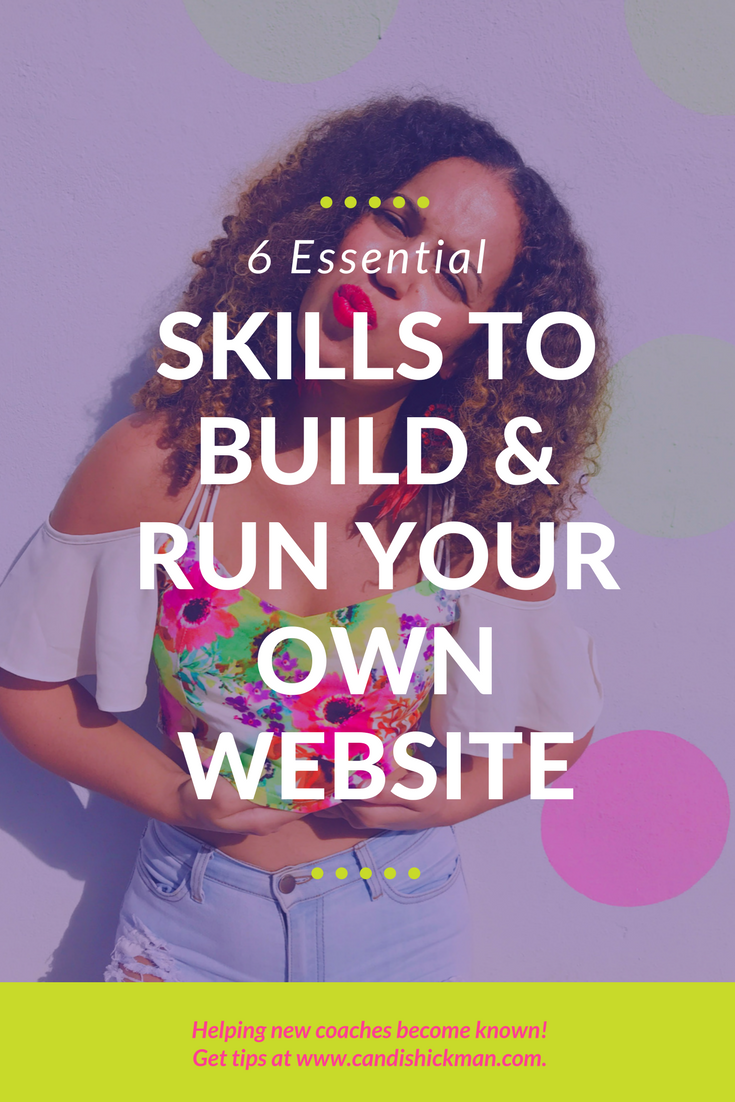You may know that a large part of promoting your personal brand online is running a successful website. Your website brings in potential clients, allows them to get a feel for what you stand for and connects them with your services. Using your blog, you can give people insight into who you are as a coach while using SEO to drive traffic, which is why learning to run your own website is so valuable.

While you could always get someone else to build and manage your website for you, I’m a big advocate for the good ol’ DIY method. A few useful skills can help you create and care for your website to make it a powerful marketing tool.
So here are 5 essential skills worth learning to build and run your own website.
1. Basic graphic design skills.
Before you run away screaming, just stay with me one moment! Having a visually pleasing website is a great way to capture the attention of your ideal audience and is an essential element in building your brand. There are some great online tools like Canva and PicMonkey where you can easily sort through templates and learn the basics of design.
Learning how to do some graphic design can be extremely useful. Whenever you need a graphic for a blog post or an infographic to explain something, you can do it yourself. There are a ton of courses online teaching the basics of design! Canva even has free courses to accompany their service!
2. Basic programming skills
While being able to make a beautiful graphic is useful, the structure of your site involves a little more than that. If you want to develop a unique and custom-made website, rather than just using a template you’d find on WordPress.com then you need some programming skills. Although I’m no expert I will say that having some super basic skills in coding is an extremely useful skill to have in your tool belt.
You could start with HTML classes, or CSS and JavaScript are also handy languages to learn. CSS goes hand in hand with HTML to help with design and style, while JavaScript is for fancy things like animation, interactivity, and apps.
3. The skill of being able to test your site.
When you’re building a website it’s a good idea to know how to test it. Testing out a website helps you weed out any bugs or possible errors. Firstly, you’ll need to check to see if your website is working on different browsers, as well as on various devices.
You’ll want to ensure that everything works as it’s supposed to, from links going to the correct places to forms submitting information as they should. Then there’s A/B testing, where you work out which elements on your website are turning the most readers into prospective clients.
4. The skill of optimizing your site for SEO (Search Engine Optimization).
Without some knowledge of search engine optimization, your brand new website will struggle to get off the ground. SEO is what helps you bring people to your site via search engines like Google, and you need to weave it through your site.
From naturally including keywords in your content to writing meta tags and descriptions using the Yoast, you should keep your website updated so it shows up in top positions when people perform searches. You’ve got to be willing to research keywords and learn the best ways to integrate them into your site. Continually develop your SEO skills and keep up with the latest advice and you’ll stay on the cutting edge of technology!
5. The skill of recognizing security risks.
Leaving your website vulnerable to security attacks isn’t a great idea, to say the least. If you don’t want your website to be hacked, you need to know how to protect it. There are some common ways your site might be left vulnerable to attacks.
Even checking the wording of the error messages you have on your website is important. For example, if login information is entered incorrectly on your site, specifying that it’s the password that’s incorrect could show a hacker that they have got one piece of information correct and now only need to guess the other.
6. The skill of content marketing and management.
Having a blog is a great way to get the message of your brand out there and to position yourself as an expert in your field. Your blog is a part of your content marketing strategy, so it’s important to make sure it’s regularly updated to show your audience that you’re active and involved online.
Building the skills to develop and run your own website is not something you’ll ever regret doing. When I start started online several years ago, I have no idea how to build and run a website, but now I have greater control over what I do online, I save money plus I have a toolkit of highly valuable skills…And soon you will too!!
*This post may include affiliate links.



